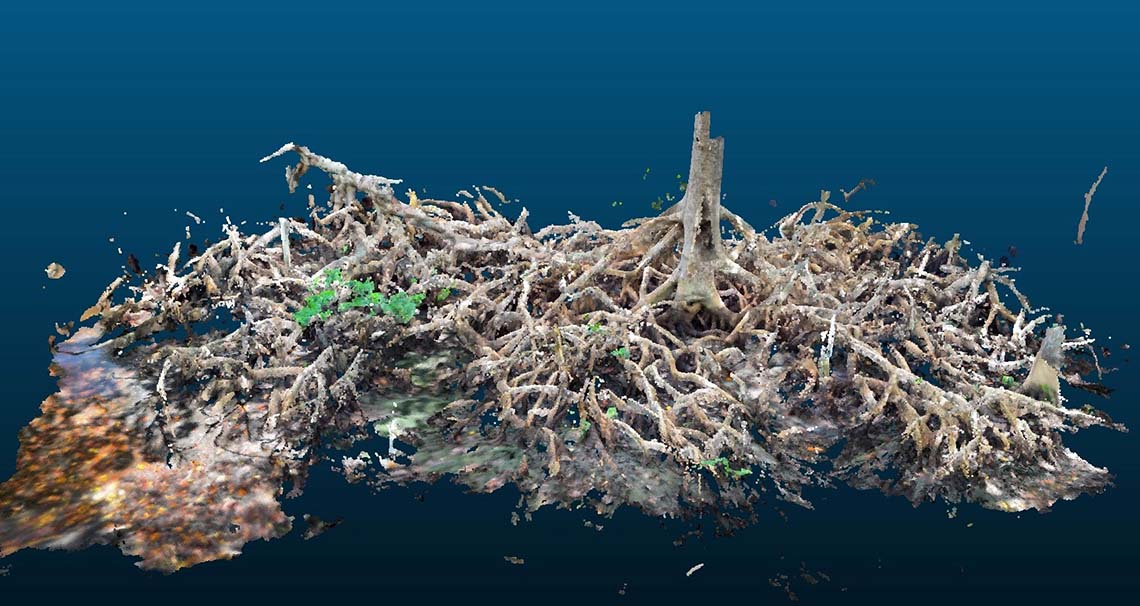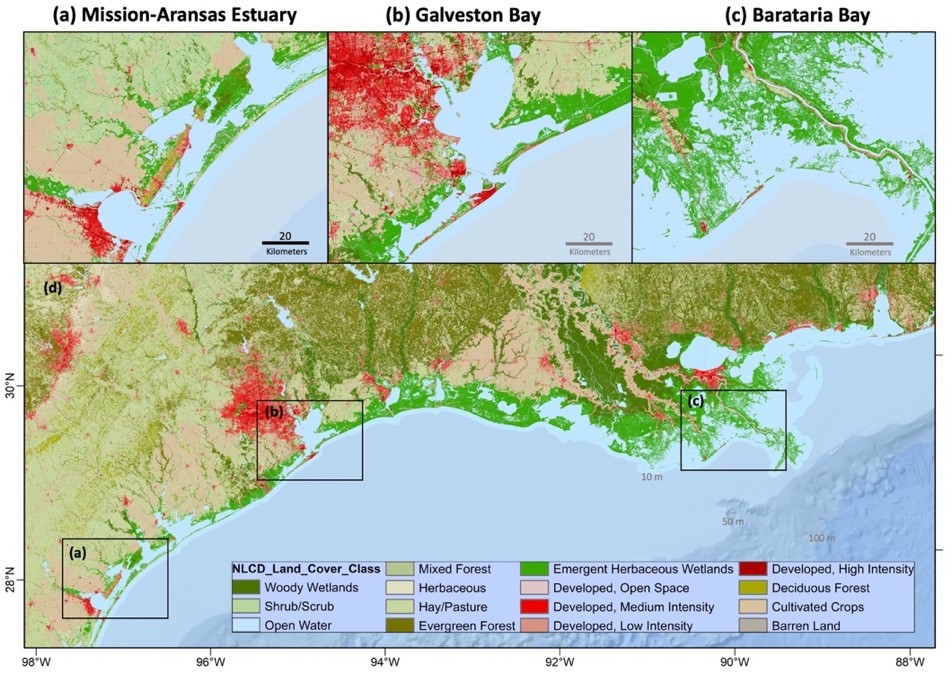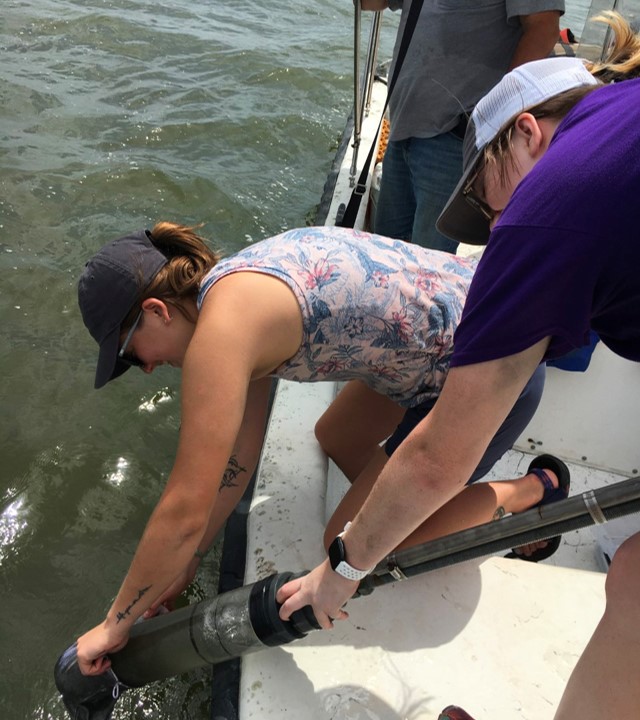News By Date

Paul Miller Becomes 4th Oceanography & Coastal Sciences Professor to Win NSF Career Award
Paul Miller, an Assistant Professor in the Department of Oceanography & Coastal Sciences, recently won an National Science Foundation Early Career Award for his work on the Saharan Air Layer.

Student Research Spotlight: Siarah Hall
CC&E undergraduate student Siarah Hall discusses her research experiences, which include trips to Bermuda and Little Cayman.

CC&E Announces Outreach Fund Sponsored by APTIM
Local environmental industry leader works CC&E to help local students learn more about the environment.

A Look At D'Elia's Tenure As Dean
A retrospective of Dean D'Elia's tenure as the longest serving dean at LSU and the longest in the history of LSU.

Congratulations to CC&E's Fall Class of 2022!
The College of the Coast & Environment is excited to congratulate its latest graduates!

Coupled Computer Modeling Can Help More Accurately Predict Coastal Flooding, Study Demonstrates
LSU researchers used a novel coupled computer modeling approach to accurately recreate the coastal flooding that occurred during Hurricane Florence, demonstrating that it is more accurate than traditional modeling approaches.

CC&E Study Shows Landbuilding in Davis Pond, Site of Freshwater Diversion
CC&E scientists say land is being created at one of two sites on Louisiana's coast

CC&E Celebrates World Fisheries Day
In honor of World Fisheries Day, here are a few highlights from the work of CC&E's fisheries researchers.

LSU Professor Captures Shockwaves from Volcano with Handmade Air Pressure Sensor
Oceanography & Coastal Sciences Professor Chunyan Li picked up the global atmospheric shockwaves sent out by the eruption of the Hunga Tonga-Hunga Ha'apai volcano on air pressure sensors in his home and office.

Letting Nature Lead the Fight - US Army Corps of Engineers Reinvests in LSU to Protect Military Infrastructure Using Nature-Based Designs
LSU researchers and the US Army Engineer Research and Development Center are using the Louisiana coastline as a living laboratory as they team up to develop a set of engineering and design strategies to protect the Army's infrastructure and people.

LSU Co-hosts Superintendents from Across the Country in an Effort to Enhance STEM Education
CC&E joined with the East Baton Rouge Parish School System and LSU's College of Human Sciences and Education to host AASA, the school superintendent's association, for their STEM Leadership Consortium.

The path to clean water: 50 years in the making
On the 50th anniversary of its passage, CC&E faculty discuss the local significance of the Clean Water Act as well as its future.

LSU Scientist leads a US team In International Effort to Understand Air-sea Gas Exchange in Labrador Sea
An LSU Scientist will be leading the US team as part of an international research expedition to the Labrador Sea

Resistance and Resilience: The Impact of Weather Disturbances on the Louisiana and Texas Coast
With a new grant from NASA, LSU scientists will track the impact of severe weather disturbances on the coastal wetlands and estuaries in Louisiana and Texas.

Sea Level Rise Sentinels: Documenting Biodiversity in the Rising Waters of the Gulf of Mexico
LSU scientists will be using innovative techniques to document biodiversity in the Gulf of Mexico as part of the NOAA's Marine Biodiversity Observation Network

LSU Researchers Join Multi-Institutional Team to Investigate Sources of Methane in Coastal Wetlands
Scientists will examine natural sources of the greenhouse gas methane along Louisiana's coast

Litter Tracker: LSU Professor Works to Find the Source of Baton Rouge Neighborhoods' Litter
Some of the litter in Baton Rouge neighborhoods may be coming from an unexpected source: the city's garbage trucks

Little Rodent, Big Appetite: Researchers identify the dietary impacts of invasive mice on the Farallon Islands
Rodents on the Farallon Islands, the largest seabird breeding colony in the contiguous U.S., have had a large impact on the native ecosystem, says new research at LSU.

New Research Sheds Light on Marine Turtles in the Gulf of Mexico
An LSU researcher releases the largest ever assessment of marine turtle diving behavior in the Gulf of Mexico.

CC&E Expands the Pipeline for a Diverse Workforce of Coastal and Environmental Scientists Through Partnerships with Four Local Schools
CC&E faculty partner with local school leaders to reach the next generation of coastal and environmental scientists.

Less Water in the Mississippi Means a Smaller Dead Zone This Year
LSU scientists determined the smaller size of the Dead Zone in the Gulf of Mexico is primarily due to lower than expected river levels

Department of Environmental Sciences Chair Wins Prestigious ACS Fellowship
Department of Environmental Sciences Chair Kevin L. Armbrust was named a 2022 Fellow of the American Chemical Society

Salty Coastal Marshes Are Moving Inland
LSU Department of Oceanography & Coastal Sciences Professor Emeritus John Day recently co-authored a study highlighting the nature of coastal wetland loss in Louisiana and around the country. The study was published on July 1 in Science Advances, a publication of the American Association for the Advancement of Sciences.

How Nuclear War Would Affect Earth Today
A new study published today provides stark information on the global impact of nuclear war.
